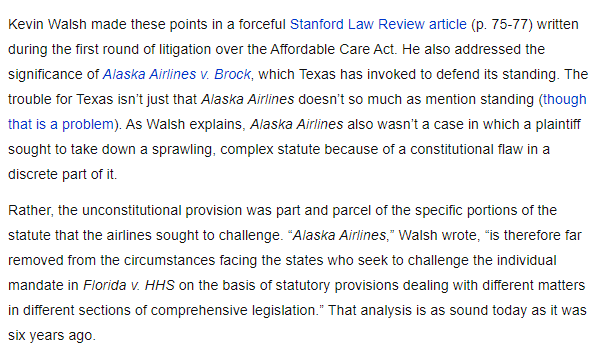In the big ACA case, the Trump administration says that the plaintiffs can challenge the whole ACA "without determining whether [they] independently have standing to challenge the individual mandate."
That ain't right. Two years ago, I explained why. https://theincidentaleconomist.com/wordpress/a-puzzle-about-standing-resolved/
That ain't right. Two years ago, I explained why. https://theincidentaleconomist.com/wordpress/a-puzzle-about-standing-resolved/
The argument hinges on what I identified as a puzzle about standing. What if a law *as a whole* harms you, but that the *individual part* that's unconstitutional doesn't? https://theincidentaleconomist.com/wordpress/a-puzzle-about-standing-and-the-affordable-care-act/
As an example, imagine someone who objects to a checkbox on a tax form about supporting political candidates on First Amendment grounds. The checkbox doesn't harm her. But the tax code as a whole does -- she has to pay taxes!
The plaintiff then argues that the checkbox provision is so entangled with the rest of the tax code that, if the checkbox provision is unconstitutional, the entire tax code has to go.
That's a bad argument: there’s no way a constitutional defect that trivial would yield a remedy that broad.
Still, aren't courts supposed to *assume* that plaintiffs are right on the merits for purposes of assessing standing?
Still, aren't courts supposed to *assume* that plaintiffs are right on the merits for purposes of assessing standing?
But that can't be right. If it were, then any plaintiff could challenge any part of a law, even if that part didn’t injure them at all, so long as the plaintiff paired the challenge with a request that the entire statute (which does injure them) should be stricken from the books.
Fortunately, that's not the law, as I explain here. I'm not saying there's no ambiguity in the case law, which (as with much of standing doctrine) is kind of a mess. https://theincidentaleconomist.com/wordpress/a-puzzle-about-standing-and-the-affordable-care-act/
But the Supreme Court has rejected the argument at least twice. For good reason! Otherwise, standing would hardly ever be a barrier to getting into court.
(And no, I don't think Alaska Airlines can -- or should -- save the Trump administration's argument here.)
I'll close by noting how anomalous it is for the Justice Department to be pressing a flawed argument that plaintiffs have standing. It's *always* on the other side of standing questions -- this is a *huge* departure from its practice.
From the start, however, this case has had nothing to do with law as we conventionally understand it. It's an exercise of raw political power. And Bill Barr's Justice Department, to his everlasting shame, is happy to go along with it.
/fin
/fin

 Read on Twitter
Read on Twitter



